Logistics Engineer Resume Examples

Mar 20, 2025
|
12 min read
Navigate your career path with this logistics engineer resume guide. Discover tips and tricks to keep your skills and accomplishments on track, ensuring your application delivers the most efficient and effective results possible.
Rated by 348 people
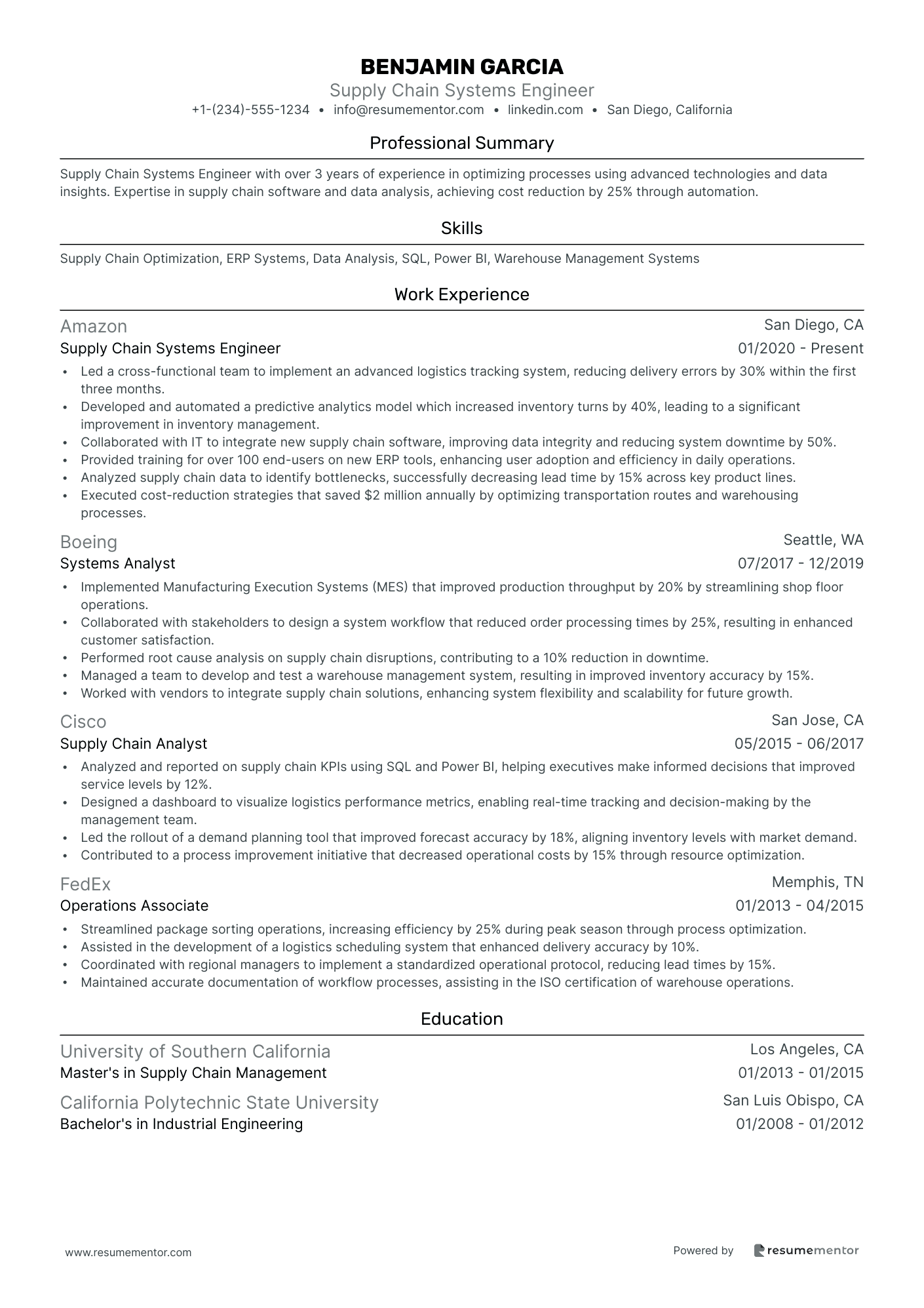
Supply Chain Systems Engineer
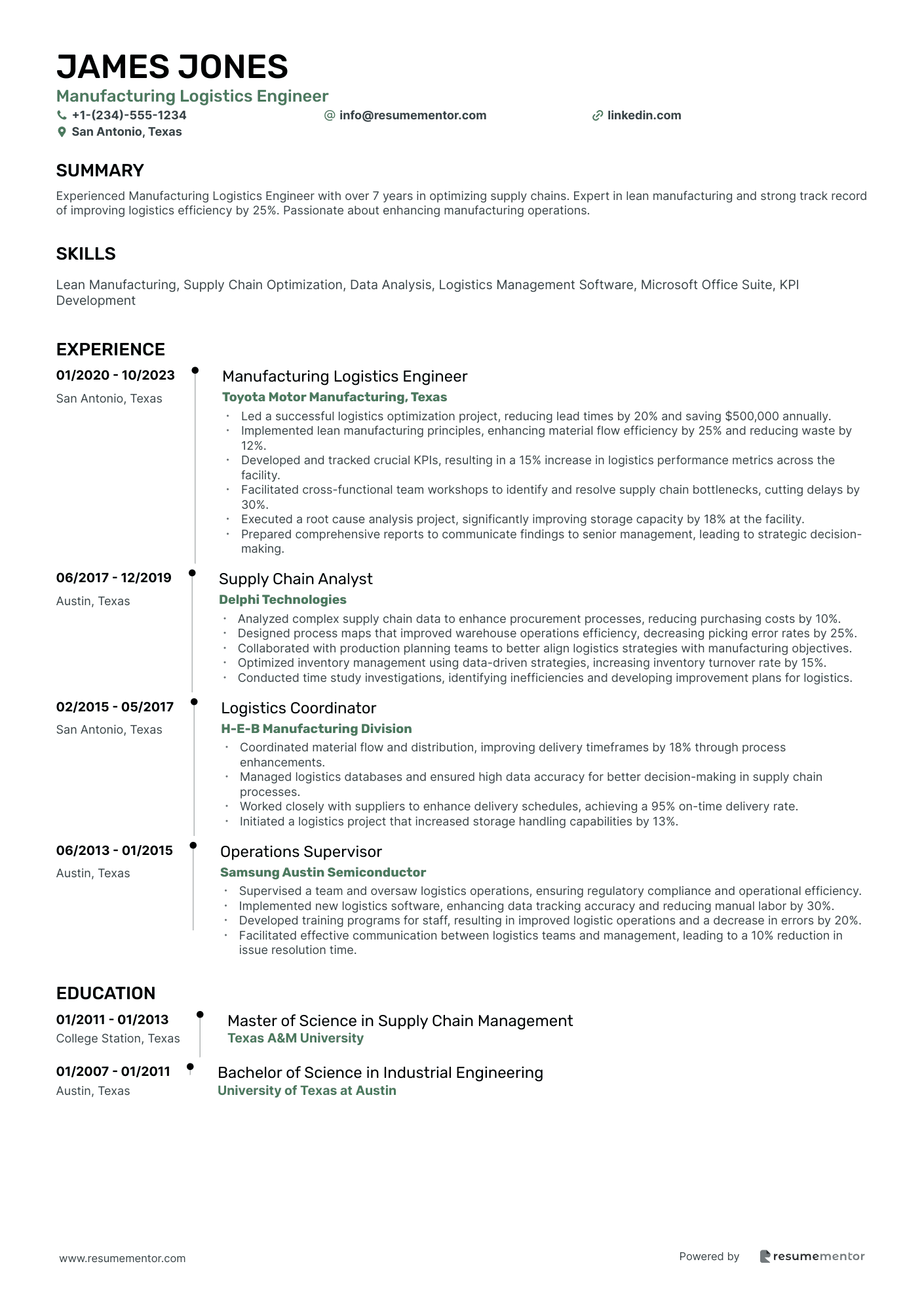
Manufacturing Logistics Engineer
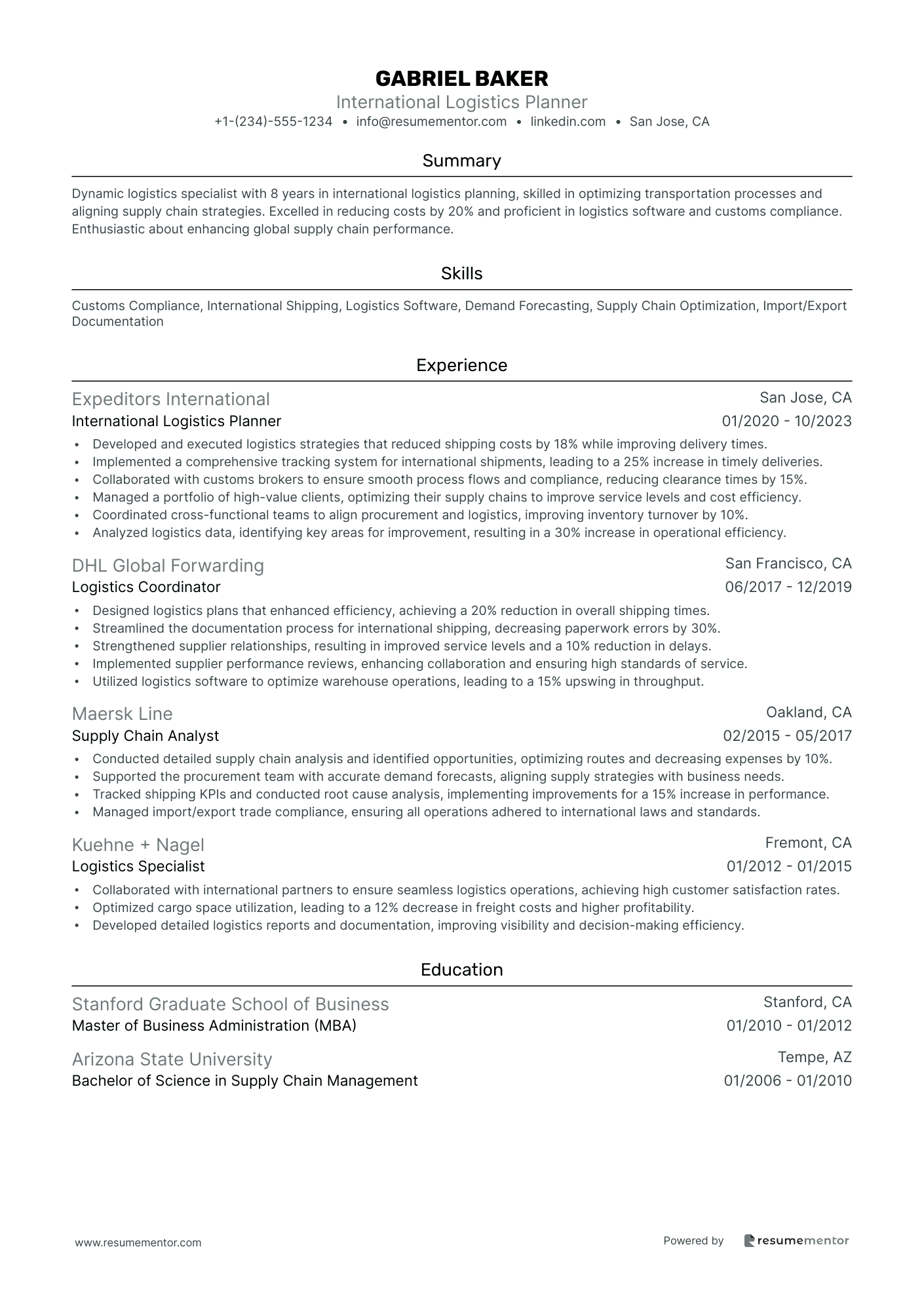
International Logistics Planner
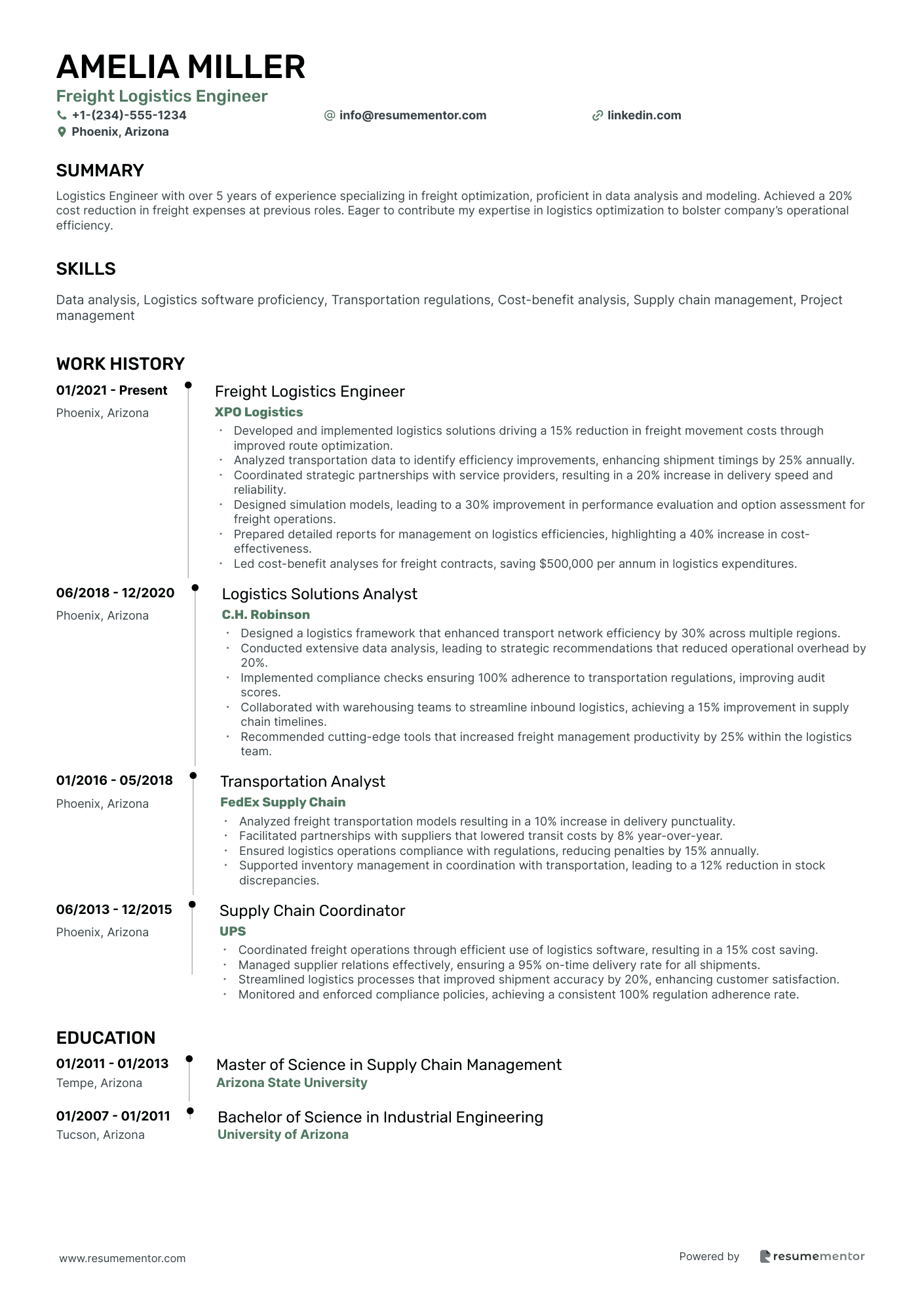
Freight Logistics Engineer
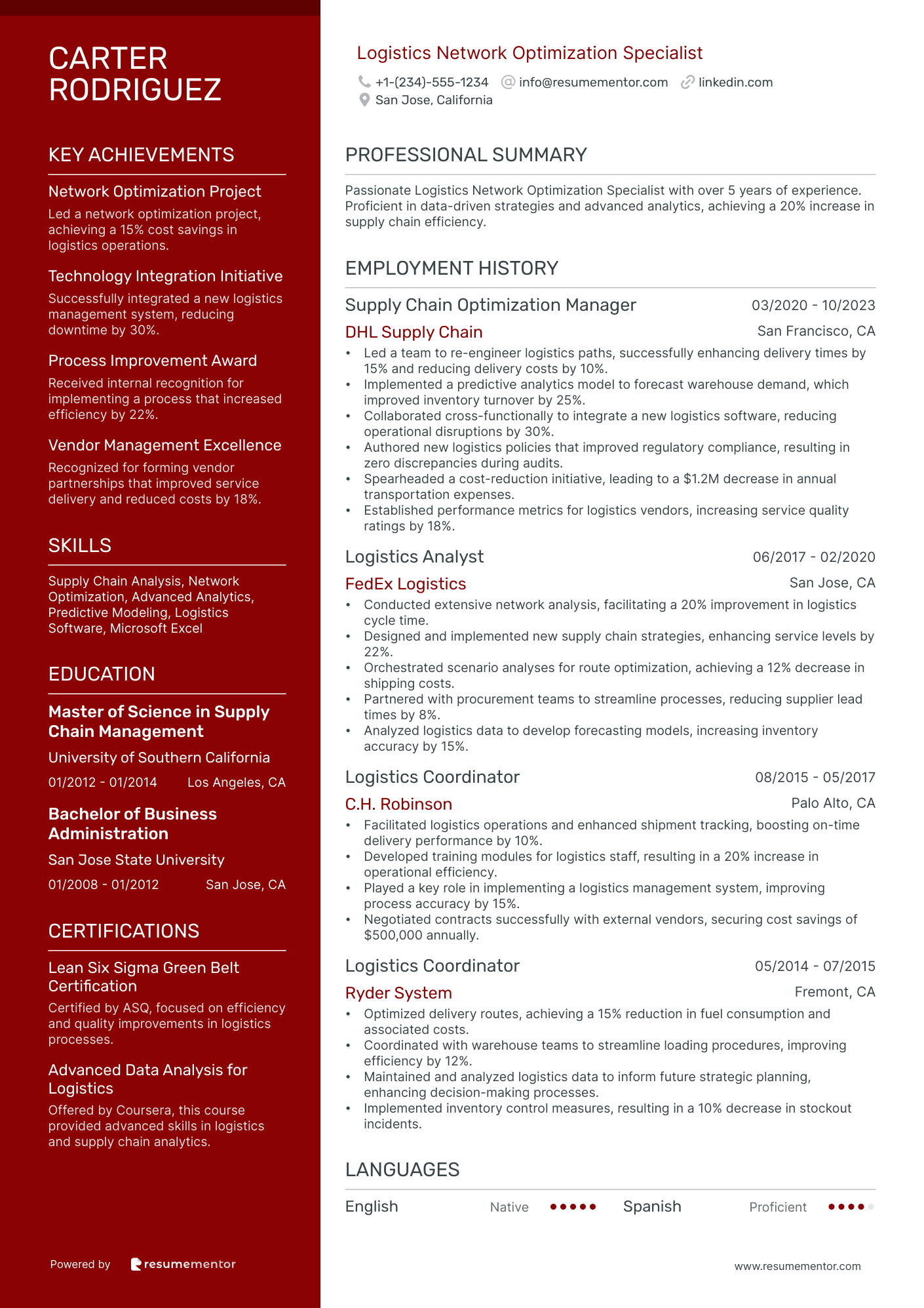
Logistics Network Optimization Specialist
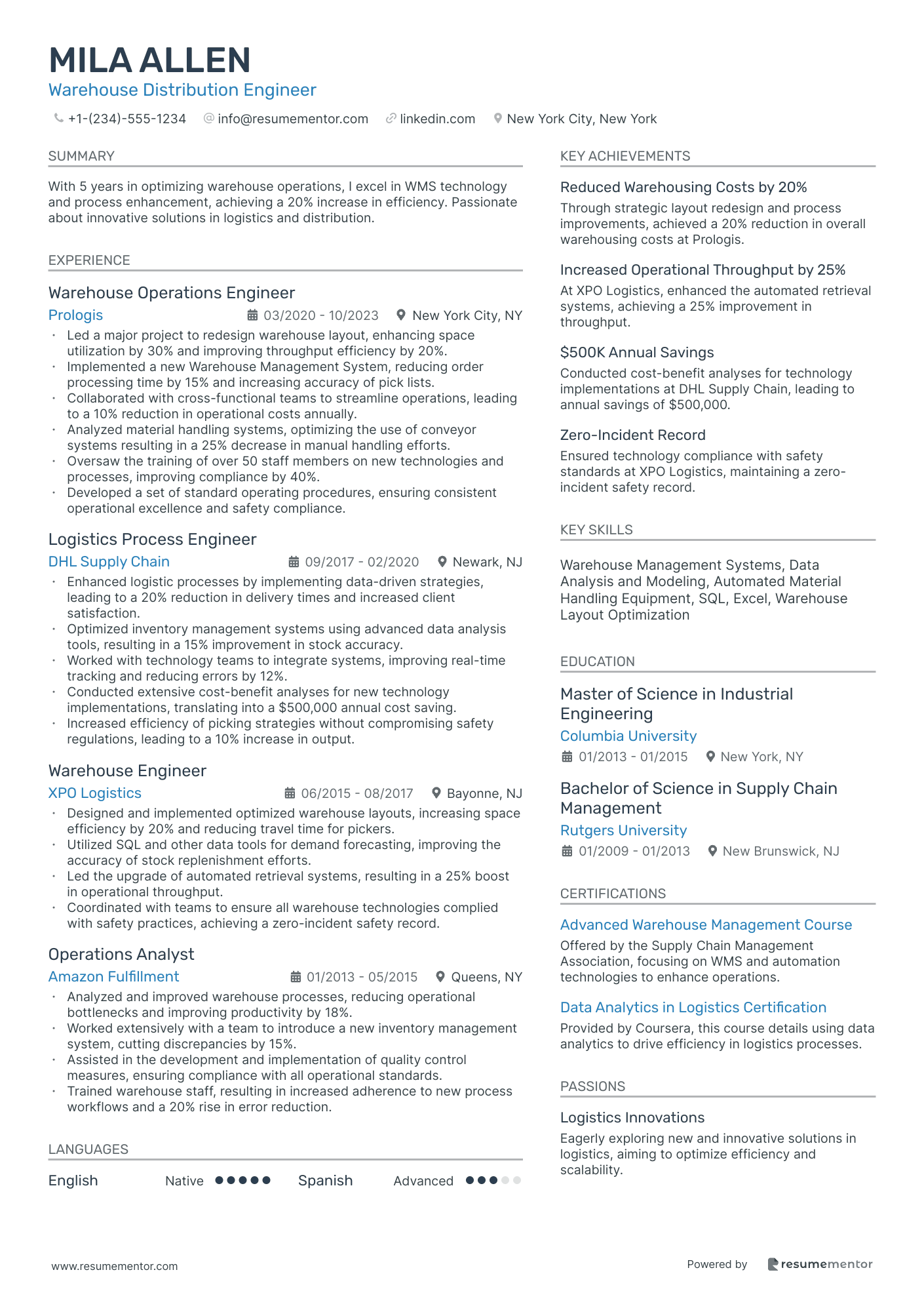
Warehouse Distribution Engineer
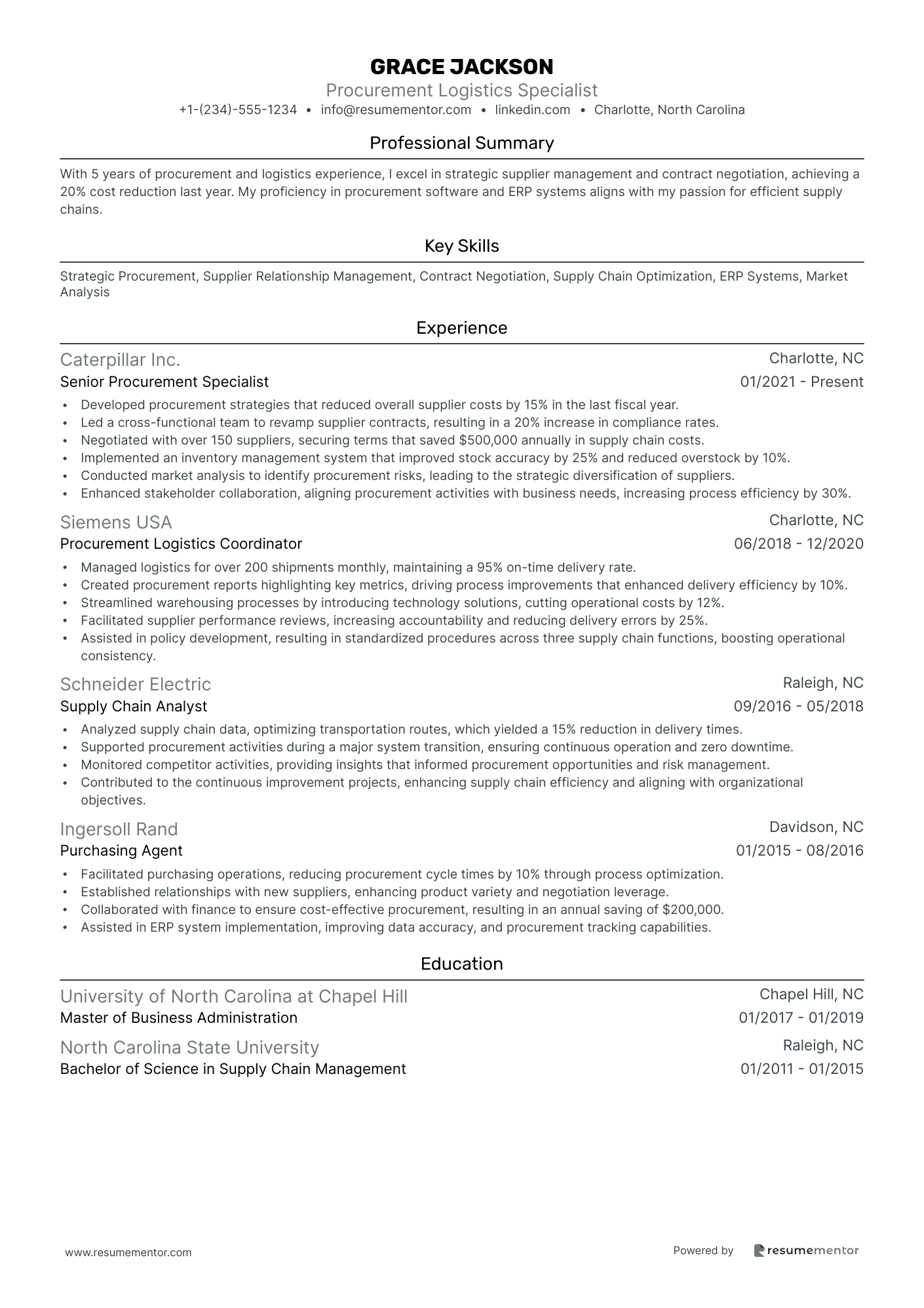
Procurement Logistics Specialist
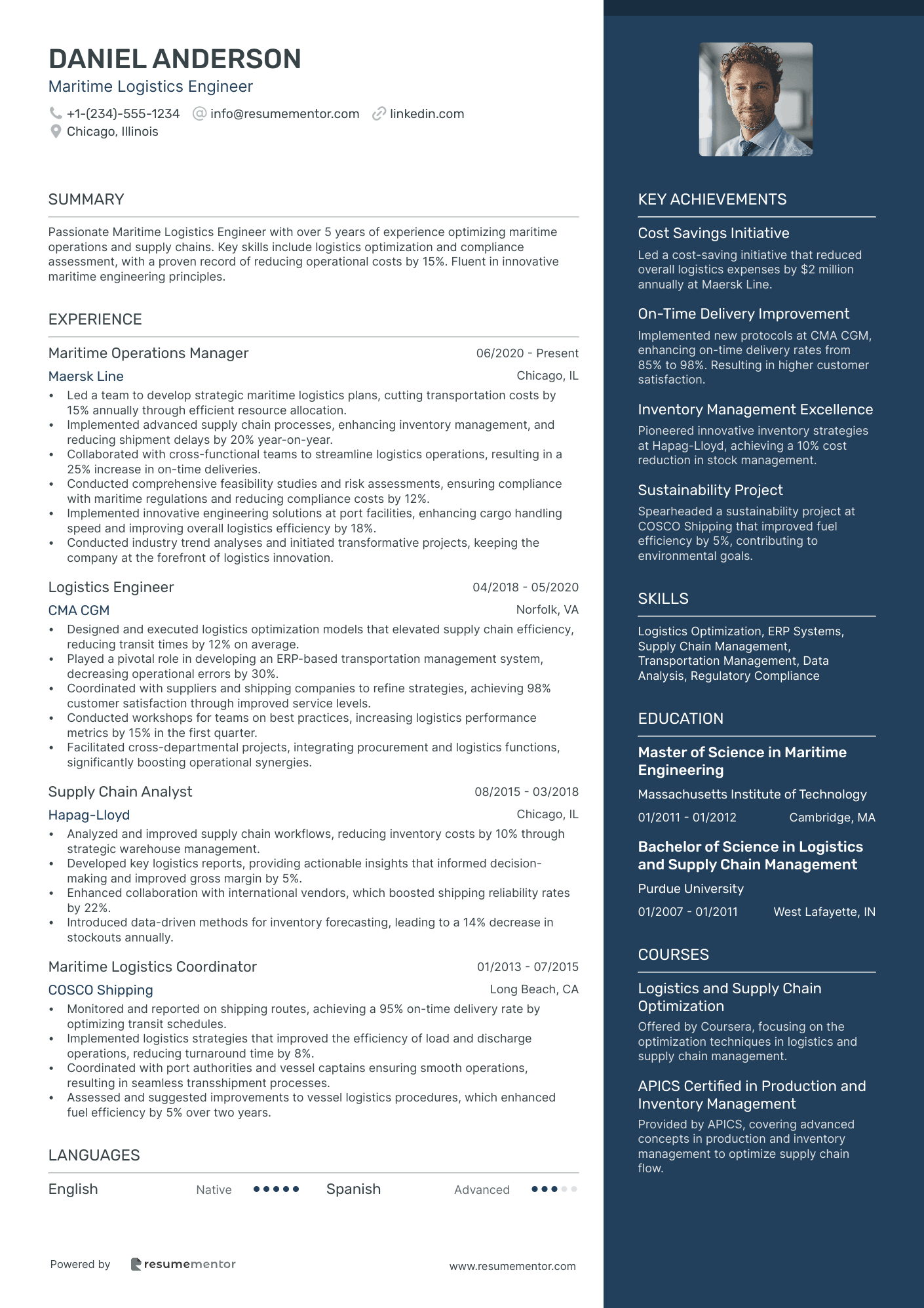
Maritime Logistics Engineer
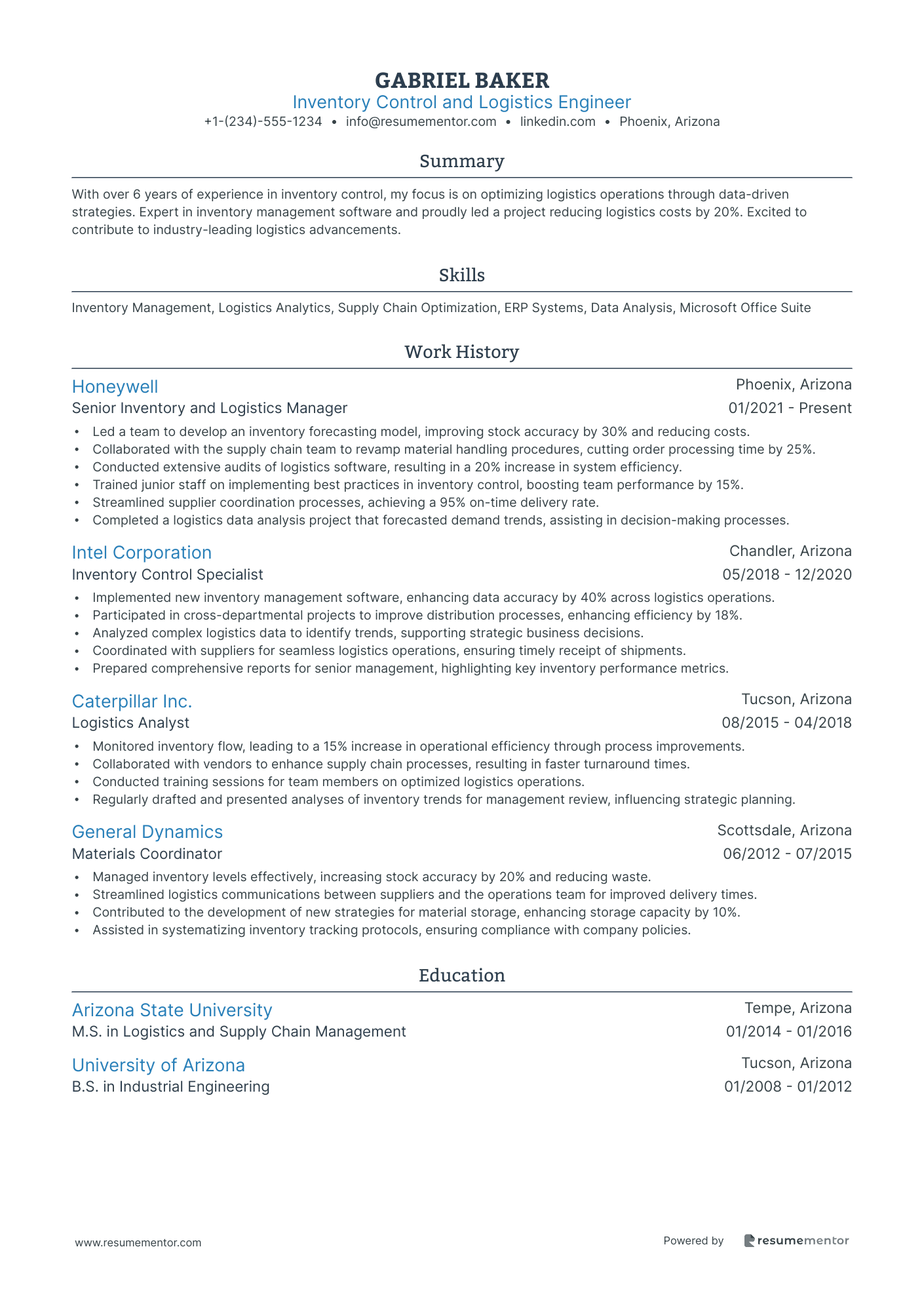
Inventory Control and Logistics Engineer

Supply Chain Systems Engineer resume sample
- •Led a cross-functional team to implement an advanced logistics tracking system, reducing delivery errors by 30% within the first three months.
- •Developed and automated a predictive analytics model which increased inventory turns by 40%, leading to a significant improvement in inventory management.
- •Collaborated with IT to integrate new supply chain software, improving data integrity and reducing system downtime by 50%.
- •Provided training for over 100 end-users on new ERP tools, enhancing user adoption and efficiency in daily operations.
- •Analyzed supply chain data to identify bottlenecks, successfully decreasing lead time by 15% across key product lines.
- •Executed cost-reduction strategies that saved $2 million annually by optimizing transportation routes and warehousing processes.
- •Implemented Manufacturing Execution Systems (MES) that improved production throughput by 20% by streamlining shop floor operations.
- •Collaborated with stakeholders to design a system workflow that reduced order processing times by 25%, resulting in enhanced customer satisfaction.
- •Performed root cause analysis on supply chain disruptions, contributing to a 10% reduction in downtime.
- •Managed a team to develop and test a warehouse management system, resulting in improved inventory accuracy by 15%.
- •Worked with vendors to integrate supply chain solutions, enhancing system flexibility and scalability for future growth.
- •Analyzed and reported on supply chain KPIs using SQL and Power BI, helping executives make informed decisions that improved service levels by 12%.
- •Designed a dashboard to visualize logistics performance metrics, enabling real-time tracking and decision-making by the management team.
- •Led the rollout of a demand planning tool that improved forecast accuracy by 18%, aligning inventory levels with market demand.
- •Contributed to a process improvement initiative that decreased operational costs by 15% through resource optimization.
- •Streamlined package sorting operations, increasing efficiency by 25% during peak season through process optimization.
- •Assisted in the development of a logistics scheduling system that enhanced delivery accuracy by 10%.
- •Coordinated with regional managers to implement a standardized operational protocol, reducing lead times by 15%.
- •Maintained accurate documentation of workflow processes, assisting in the ISO certification of warehouse operations.
Manufacturing Logistics Engineer resume sample
- •Led a successful logistics optimization project, reducing lead times by 20% and saving $500,000 annually.
- •Implemented lean manufacturing principles, enhancing material flow efficiency by 25% and reducing waste by 12%.
- •Developed and tracked crucial KPIs, resulting in a 15% increase in logistics performance metrics across the facility.
- •Facilitated cross-functional team workshops to identify and resolve supply chain bottlenecks, cutting delays by 30%.
- •Executed a root cause analysis project, significantly improving storage capacity by 18% at the facility.
- •Prepared comprehensive reports to communicate findings to senior management, leading to strategic decision-making.
- •Analyzed complex supply chain data to enhance procurement processes, reducing purchasing costs by 10%.
- •Designed process maps that improved warehouse operations efficiency, decreasing picking error rates by 25%.
- •Collaborated with production planning teams to better align logistics strategies with manufacturing objectives.
- •Optimized inventory management using data-driven strategies, increasing inventory turnover rate by 15%.
- •Conducted time study investigations, identifying inefficiencies and developing improvement plans for logistics.
- •Coordinated material flow and distribution, improving delivery timeframes by 18% through process enhancements.
- •Managed logistics databases and ensured high data accuracy for better decision-making in supply chain processes.
- •Worked closely with suppliers to enhance delivery schedules, achieving a 95% on-time delivery rate.
- •Initiated a logistics project that increased storage handling capabilities by 13%.
- •Supervised a team and oversaw logistics operations, ensuring regulatory compliance and operational efficiency.
- •Implemented new logistics software, enhancing data tracking accuracy and reducing manual labor by 30%.
- •Developed training programs for staff, resulting in improved logistic operations and a decrease in errors by 20%.
- •Facilitated effective communication between logistics teams and management, leading to a 10% reduction in issue resolution time.
International Logistics Planner resume sample
- •Developed and executed logistics strategies that reduced shipping costs by 18% while improving delivery times.
- •Implemented a comprehensive tracking system for international shipments, leading to a 25% increase in timely deliveries.
- •Collaborated with customs brokers to ensure smooth process flows and compliance, reducing clearance times by 15%.
- •Managed a portfolio of high-value clients, optimizing their supply chains to improve service levels and cost efficiency.
- •Coordinated cross-functional teams to align procurement and logistics, improving inventory turnover by 10%.
- •Analyzed logistics data, identifying key areas for improvement, resulting in a 30% increase in operational efficiency.
- •Designed logistics plans that enhanced efficiency, achieving a 20% reduction in overall shipping times.
- •Streamlined the documentation process for international shipping, decreasing paperwork errors by 30%.
- •Strengthened supplier relationships, resulting in improved service levels and a 10% reduction in delays.
- •Implemented supplier performance reviews, enhancing collaboration and ensuring high standards of service.
- •Utilized logistics software to optimize warehouse operations, leading to a 15% upswing in throughput.
- •Conducted detailed supply chain analysis and identified opportunities, optimizing routes and decreasing expenses by 10%.
- •Supported the procurement team with accurate demand forecasts, aligning supply strategies with business needs.
- •Tracked shipping KPIs and conducted root cause analysis, implementing improvements for a 15% increase in performance.
- •Managed import/export trade compliance, ensuring all operations adhered to international laws and standards.
- •Collaborated with international partners to ensure seamless logistics operations, achieving high customer satisfaction rates.
- •Optimized cargo space utilization, leading to a 12% decrease in freight costs and higher profitability.
- •Developed detailed logistics reports and documentation, improving visibility and decision-making efficiency.
Freight Logistics Engineer resume sample
- •Developed and implemented logistics solutions driving a 15% reduction in freight movement costs through improved route optimization.
- •Analyzed transportation data to identify efficiency improvements, enhancing shipment timings by 25% annually.
- •Coordinated strategic partnerships with service providers, resulting in a 20% increase in delivery speed and reliability.
- •Designed simulation models, leading to a 30% improvement in performance evaluation and option assessment for freight operations.
- •Prepared detailed reports for management on logistics efficiencies, highlighting a 40% increase in cost-effectiveness.
- •Led cost-benefit analyses for freight contracts, saving $500,000 per annum in logistics expenditures.
- •Designed a logistics framework that enhanced transport network efficiency by 30% across multiple regions.
- •Conducted extensive data analysis, leading to strategic recommendations that reduced operational overhead by 20%.
- •Implemented compliance checks ensuring 100% adherence to transportation regulations, improving audit scores.
- •Collaborated with warehousing teams to streamline inbound logistics, achieving a 15% improvement in supply chain timelines.
- •Recommended cutting-edge tools that increased freight management productivity by 25% within the logistics team.
- •Analyzed freight transportation models resulting in a 10% increase in delivery punctuality.
- •Facilitated partnerships with suppliers that lowered transit costs by 8% year-over-year.
- •Ensured logistics operations compliance with regulations, reducing penalties by 15% annually.
- •Supported inventory management in coordination with transportation, leading to a 12% reduction in stock discrepancies.
- •Coordinated freight operations through efficient use of logistics software, resulting in a 15% cost saving.
- •Managed supplier relations effectively, ensuring a 95% on-time delivery rate for all shipments.
- •Streamlined logistics processes that improved shipment accuracy by 20%, enhancing customer satisfaction.
- •Monitored and enforced compliance policies, achieving a consistent 100% regulation adherence rate.
Logistics Network Optimization Specialist resume sample
- •Led a team to re-engineer logistics paths, successfully enhancing delivery times by 15% and reducing delivery costs by 10%.
- •Implemented a predictive analytics model to forecast warehouse demand, which improved inventory turnover by 25%.
- •Collaborated cross-functionally to integrate a new logistics software, reducing operational disruptions by 30%.
- •Authored new logistics policies that improved regulatory compliance, resulting in zero discrepancies during audits.
- •Spearheaded a cost-reduction initiative, leading to a $1.2M decrease in annual transportation expenses.
- •Established performance metrics for logistics vendors, increasing service quality ratings by 18%.
- •Conducted extensive network analysis, facilitating a 20% improvement in logistics cycle time.
- •Designed and implemented new supply chain strategies, enhancing service levels by 22%.
- •Orchestrated scenario analyses for route optimization, achieving a 12% decrease in shipping costs.
- •Partnered with procurement teams to streamline processes, reducing supplier lead times by 8%.
- •Analyzed logistics data to develop forecasting models, increasing inventory accuracy by 15%.
- •Facilitated logistics operations and enhanced shipment tracking, boosting on-time delivery performance by 10%.
- •Developed training modules for logistics staff, resulting in a 20% increase in operational efficiency.
- •Played a key role in implementing a logistics management system, improving process accuracy by 15%.
- •Negotiated contracts successfully with external vendors, securing cost savings of $500,000 annually.
- •Optimized delivery routes, achieving a 15% reduction in fuel consumption and associated costs.
- •Coordinated with warehouse teams to streamline loading procedures, improving efficiency by 12%.
- •Maintained and analyzed logistics data to inform future strategic planning, enhancing decision-making processes.
- •Implemented inventory control measures, resulting in a 10% decrease in stockout incidents.
Warehouse Distribution Engineer resume sample
- •Led a major project to redesign warehouse layout, enhancing space utilization by 30% and improving throughput efficiency by 20%.
- •Implemented a new Warehouse Management System, reducing order processing time by 15% and increasing accuracy of pick lists.
- •Collaborated with cross-functional teams to streamline operations, leading to a 10% reduction in operational costs annually.
- •Analyzed material handling systems, optimizing the use of conveyor systems resulting in a 25% decrease in manual handling efforts.
- •Oversaw the training of over 50 staff members on new technologies and processes, improving compliance by 40%.
- •Developed a set of standard operating procedures, ensuring consistent operational excellence and safety compliance.
- •Enhanced logistic processes by implementing data-driven strategies, leading to a 20% reduction in delivery times and increased client satisfaction.
- •Optimized inventory management systems using advanced data analysis tools, resulting in a 15% improvement in stock accuracy.
- •Worked with technology teams to integrate systems, improving real-time tracking and reducing errors by 12%.
- •Conducted extensive cost-benefit analyses for new technology implementations, translating into a $500,000 annual cost saving.
- •Increased efficiency of picking strategies without compromising safety regulations, leading to a 10% increase in output.
- •Designed and implemented optimized warehouse layouts, increasing space efficiency by 20% and reducing travel time for pickers.
- •Utilized SQL and other data tools for demand forecasting, improving the accuracy of stock replenishment efforts.
- •Led the upgrade of automated retrieval systems, resulting in a 25% boost in operational throughput.
- •Coordinated with teams to ensure all warehouse technologies complied with safety practices, achieving a zero-incident safety record.
- •Analyzed and improved warehouse processes, reducing operational bottlenecks and improving productivity by 18%.
- •Worked extensively with a team to introduce a new inventory management system, cutting discrepancies by 15%.
- •Assisted in the development and implementation of quality control measures, ensuring compliance with all operational standards.
- •Trained warehouse staff, resulting in increased adherence to new process workflows and a 20% rise in error reduction.
Procurement Logistics Specialist resume sample
- •Developed procurement strategies that reduced overall supplier costs by 15% in the last fiscal year.
- •Led a cross-functional team to revamp supplier contracts, resulting in a 20% increase in compliance rates.
- •Negotiated with over 150 suppliers, securing terms that saved $500,000 annually in supply chain costs.
- •Implemented an inventory management system that improved stock accuracy by 25% and reduced overstock by 10%.
- •Conducted market analysis to identify procurement risks, leading to the strategic diversification of suppliers.
- •Enhanced stakeholder collaboration, aligning procurement activities with business needs, increasing process efficiency by 30%.
- •Managed logistics for over 200 shipments monthly, maintaining a 95% on-time delivery rate.
- •Created procurement reports highlighting key metrics, driving process improvements that enhanced delivery efficiency by 10%.
- •Streamlined warehousing processes by introducing technology solutions, cutting operational costs by 12%.
- •Facilitated supplier performance reviews, increasing accountability and reducing delivery errors by 25%.
- •Assisted in policy development, resulting in standardized procedures across three supply chain functions, boosting operational consistency.
- •Analyzed supply chain data, optimizing transportation routes, which yielded a 15% reduction in delivery times.
- •Supported procurement activities during a major system transition, ensuring continuous operation and zero downtime.
- •Monitored competitor activities, providing insights that informed procurement opportunities and risk management.
- •Contributed to the continuous improvement projects, enhancing supply chain efficiency and aligning with organizational objectives.
- •Facilitated purchasing operations, reducing procurement cycle times by 10% through process optimization.
- •Established relationships with new suppliers, enhancing product variety and negotiation leverage.
- •Collaborated with finance to ensure cost-effective procurement, resulting in an annual saving of $200,000.
- •Assisted in ERP system implementation, improving data accuracy, and procurement tracking capabilities.
Maritime Logistics Engineer resume sample
- •Led a team to develop strategic maritime logistics plans, cutting transportation costs by 15% annually through efficient resource allocation.
- •Implemented advanced supply chain processes, enhancing inventory management, and reducing shipment delays by 20% year-on-year.
- •Collaborated with cross-functional teams to streamline logistics operations, resulting in a 25% increase in on-time deliveries.
- •Conducted comprehensive feasibility studies and risk assessments, ensuring compliance with maritime regulations and reducing compliance costs by 12%.
- •Implemented innovative engineering solutions at port facilities, enhancing cargo handling speed and improving overall logistics efficiency by 18%.
- •Conducted industry trend analyses and initiated transformative projects, keeping the company at the forefront of logistics innovation.
- •Designed and executed logistics optimization models that elevated supply chain efficiency, reducing transit times by 12% on average.
- •Played a pivotal role in developing an ERP-based transportation management system, decreasing operational errors by 30%.
- •Coordinated with suppliers and shipping companies to refine strategies, achieving 98% customer satisfaction through improved service levels.
- •Conducted workshops for teams on best practices, increasing logistics performance metrics by 15% in the first quarter.
- •Facilitated cross-departmental projects, integrating procurement and logistics functions, significantly boosting operational synergies.
- •Analyzed and improved supply chain workflows, reducing inventory costs by 10% through strategic warehouse management.
- •Developed key logistics reports, providing actionable insights that informed decision-making and improved gross margin by 5%.
- •Enhanced collaboration with international vendors, which boosted shipping reliability rates by 22%.
- •Introduced data-driven methods for inventory forecasting, leading to a 14% decrease in stockouts annually.
- •Monitored and reported on shipping routes, achieving a 95% on-time delivery rate by optimizing transit schedules.
- •Implemented logistics strategies that improved the efficiency of load and discharge operations, reducing turnaround time by 8%.
- •Coordinated with port authorities and vessel captains ensuring smooth operations, resulting in seamless transshipment processes.
- •Assessed and suggested improvements to vessel logistics procedures, which enhanced fuel efficiency by 5% over two years.
Inventory Control and Logistics Engineer resume sample
- •Led a team to develop an inventory forecasting model, improving stock accuracy by 30% and reducing costs.
- •Collaborated with the supply chain team to revamp material handling procedures, cutting order processing time by 25%.
- •Conducted extensive audits of logistics software, resulting in a 20% increase in system efficiency.
- •Trained junior staff on implementing best practices in inventory control, boosting team performance by 15%.
- •Streamlined supplier coordination processes, achieving a 95% on-time delivery rate.
- •Completed a logistics data analysis project that forecasted demand trends, assisting in decision-making processes.
- •Implemented new inventory management software, enhancing data accuracy by 40% across logistics operations.
- •Participated in cross-departmental projects to improve distribution processes, enhancing efficiency by 18%.
- •Analyzed complex logistics data to identify trends, supporting strategic business decisions.
- •Coordinated with suppliers for seamless logistics operations, ensuring timely receipt of shipments.
- •Prepared comprehensive reports for senior management, highlighting key inventory performance metrics.
- •Monitored inventory flow, leading to a 15% increase in operational efficiency through process improvements.
- •Collaborated with vendors to enhance supply chain processes, resulting in faster turnaround times.
- •Conducted training sessions for team members on optimized logistics operations.
- •Regularly drafted and presented analyses of inventory trends for management review, influencing strategic planning.
- •Managed inventory levels effectively, increasing stock accuracy by 20% and reducing waste.
- •Streamlined logistics communications between suppliers and the operations team for improved delivery times.
- •Contributed to the development of new strategies for material storage, enhancing storage capacity by 10%.
- •Assisted in systematizing inventory tracking protocols, ensuring compliance with company policies.
Navigating the world of logistics engineering is like orchestrating a symphony, where precision, planning, and problem-solving come together seamlessly. As a logistics engineer, your resume is the key to unlocking opportunities in a competitive job market. Translating your ability to manage intricate supply chains and optimize processes into words can be daunting. You may find organizing your experiences and highlighting essential logistics skills challenging.
This is where a resume template becomes invaluable, providing a structured framework that guides your writing. It ensures that your crucial information is presented clearly and professionally. Explore these resume templates to get started on building a standout document.
Your resume should do more than just list achievements; it needs to connect your skills to job expectations effectively. By highlighting your expertise in navigating complex logistics systems, managing inventory, and implementing cost-saving measures, you can tailor your resume to meet specific job requirements and make it stand out.
Throughout this guide, you’ll find tools and tips to help you create a more compelling resume. We’ll cover strategies to convey your accomplishments effectively, enhancing your chance of securing your next role. Now, let's begin crafting a resume that genuinely reflects your expertise as a logistics engineer.
Key Takeaways
- Your resume should go beyond listing achievements, effectively connecting your skills to job expectations to stand out in a competitive market.
- Utilize resume templates to structure your document, ensuring clarity and professionalism, especially when organizing logistics skills and experiences.
- The reverse chronological format is ideal for logistics engineers, as it highlights work history and career growth to align closely with job requirements.
- Focus on quantifiable achievements and strong action words in your experience section to convey your active role and contributions clearly.
- Consider including sections like language skills, hobbies, volunteer work, and books to showcase a well-rounded character and ongoing learning commitment.
What to focus on when writing your logistics engineer resume
A logistics engineer resume should clearly highlight your expertise in optimizing supply chain processes and enhancing overall efficiency. It's important to emphasize your strong problem-solving skills and proficiency with logistics software, showcasing your experience in cost reduction and process improvement. Presenting a well-structured resume plays a crucial role in making a strong first impression. Below, we'll delve into each essential section with more detail to guide you in crafting a standout resume.
How to structure your logistics engineer resume
- Contact Information — At the top of the resume, include your full name, phone number, email address, and LinkedIn profile to ensure a recruiter can easily contact you. This basic yet crucial section sets a professional tone and facilitates easy communication throughout the hiring process.
- Professional Summary — Begin with a brief overview that captures your logistics engineering experience, highlighting how your skills and expertise positively impact supply chain management and logistics planning. This section should succinctly showcase your career highlights and set the stage for the detailed information that follows.
- Work Experience — Delve into your past roles, sharing responsibilities and achievements that illustrate your ability to optimize logistics and improve process efficiency. Using quantifiable metrics adds credibility to your accomplishments, demonstrating how you've contributed to cost reduction and operational improvements.
- Skills Section — Emphasize your core competencies, like proficiency in logistics software, project management, and data analysis, all crucial for enhancing logistics processes. Highlighting these skills underscores your ability to implement effective solutions within a logistics context.
- Education — Outline your educational background, spotlighting degrees in industrial engineering, supply chain management, or logistics to underscore your foundational knowledge. This section reinforces your technical expertise and commitment to your professional growth.
- Certifications — List any relevant certifications, such as APICS Certified Supply Chain Professional (CSCP) or Six Sigma Lean, to further validate your expertise and commitment to staying current in the field. These credentials can give you a competitive edge, especially in specialized roles.
Thinking about the overall format of your resume is just as important as the content. Next, we'll cover each section in more depth, ensuring your resume presents your logistics engineering expertise effectively.
Which resume format to choose
In the logistics industry, selecting the right resume format is crucial for making a strong impression. A reverse chronological format works well for logistics engineers because it puts your work history and career growth front and center. Employers can quickly and easily spot the relevant experience and skills needed in this detail-oriented field.
To enhance the visual appeal of your resume, consider using fonts like Raleway, Montserrat, or Lato. These modern fonts not only provide a sleek and professional look but also ensure clarity and readability, which are essential when conveying complex logistics information.
When it comes to file format, always save and send your resume as a PDF. This ensures that your carefully arranged layout remains intact and looks the same on any device or screen. Consistency in your presentation reflects the precision expected in the logistics sector.
Maintaining one-inch margins on all sides of your resume is important as well. This spacing ensures a neat appearance and improves readability, helping your information stand out without overwhelming the reader. Attention to these details reflects the meticulous nature required in logistics engineering.
By focusing on these aspects, you can craft a resume that not only presents your qualifications effectively but also resonates with the organizational skills and attention to detail valued in the logistics field.
How to write a quantifiable resume experience section
The experience section in your logistics engineer resume is crucial because it showcases your professional journey and demonstrates your skills through concrete achievements. Start by organizing this section in reverse chronological order, beginning with your most recent job and including relevant roles from the past 10 to 15 years. Highlight job titles that reflect your growth in logistics engineering, making sure that your experiences speak directly to the employer's needs. Tailor your resume for each job application by aligning your skills with the job ad, using similar language and keywords for a seamless fit. Strong action words like "optimized," "implemented," and "improved" help communicate your active role and accomplishments. This focused tailoring ensures your resume not only demonstrates your abilities but also shows that you're the perfect candidate for the role.
Here’s a refined example of a strong logistics engineer experience section:
- •Optimized supply chain processes, boosting efficiency by 20% and cutting costs by $500K annually.
- •Implemented a new tracking system, improving delivery accuracy by 15% and elevating customer satisfaction by 18%.
- •Led a team of 12 in a logistics overhaul, achieving a 25% reduction in delivery times.
- •Developed data-driven strategies for inventory management, reducing excess inventory by 30%.
This experience section stands out by weaving together concrete achievements that clearly illustrate your expertise and impact. The quantifiable evidence in each bullet point makes your skills immediately apparent to potential employers. Using strong action words effectively conveys your active participation in driving improvements within the organization. Each entry is aligned with typical logistics engineer requirements, ensuring that the reader perceives you as an ideal match for the role. By focusing on results backed by numbers and purposeful actions, your resume becomes not just informative but also compelling to hiring managers.
Collaboration-Focused resume experience section
A collaboration-focused logistics engineer resume experience section should effectively showcase your ability to work with others to achieve shared goals. Begin by selecting projects or roles where collaboration was key to success. Highlight how your teamwork led to significant improvements or accomplishments in logistics operations. Use bullet points to convey these achievements clearly and succinctly. It's crucial to detail not only your actions but also the positive impact they had on your team and the organization.
This section should weave a narrative of partnership and cooperation, highlighting initiatives where your contributions strengthened team dynamics or enhanced efficiency. Always aim to quantify your achievements, whether through improved delivery times, cost reductions, or more efficient supply chain operations. By focusing on results, you can demonstrate the tangible benefits of your collaboration skills. This makes you stand out to employers seeking a team player capable of driving logistics processes forward through effective partnership with others.
Logistics Engineer
Global Transport Solutions
2020 - 2023
- Led a cross-functional team to enhance inventory management, reducing stockouts by 30%.
- Coordinated with suppliers and transport partners to streamline the supply chain, decreasing transportation costs by 15%.
- Developed and implemented a new scheduling system in collaboration with IT, improving delivery times by 20%.
- Facilitated weekly partnership meetings to resolve logistical challenges, enhancing team communication and efficiency.
Innovation-Focused resume experience section
An innovation-focused logistics engineer resume experience section should clearly showcase your ability to enhance systems and implement creative solutions. Start by describing the scope and impact of your projects, highlighting how you've driven improvements in efficiency or reduced costs with innovative strategies. Including measurable outcomes, like specific percentage increases in delivery speed or cost reductions, will underscore your success.
Use bullet points to detail your achievements, emphasizing your creativity in solving logistics challenges. Keep your language straightforward and ensure each point flows naturally into the next. Demonstrate your inventive thinking in logistics engineering and explain how your unique approaches have benefited your previous employers. Here's an example:
Senior Logistics Engineer
Tech Logistics Solutions
June 2020 - Present
- Led a team to design a new inventory management system, cutting stock discrepancies by 15%.
- Developed a predictive analytics tool, which boosted delivery route efficiency by 20%.
- Streamlined supply chain processes to achieve a 10% cost reduction.
- Collaborated with cross-functional teams launching a digital logistics platform.
Responsibility-Focused resume experience section
A responsibility-focused logistics engineer resume experience section should do more than just list tasks—it should highlight the real impact of your work. Begin by identifying the key responsibilities you managed and the challenges that arose. Follow by describing how you tackled these challenges, providing specific examples of solutions you implemented. Use active language that demonstrates your initiative and highlights the results you achieved. Give concrete evidence of your contributions by quantifying accomplishments whenever possible.
For example, managing a complex supply chain project could have led to improved efficiency or reduced costs, and that should be thoroughly detailed. Elaborate on tasks such as optimizing inventory systems or coordinating transportation logistics, and explain how these efforts directly supported the business's success. Each bullet point should reflect the breadth and depth of your experience, ensuring it connects with the expectations of a logistics engineer. Through this approach, make sure your experience resonates with potential employers by being both impressive and relatable.
Logistics Engineer
Global Supply Solutions
January 2020 - Present
- Supervised a team of 10 logistics coordinators, ensuring projects were completed on time and within budget.
- Implemented a new inventory management system that reduced waste by 20% and increased order accuracy.
- Coordinated supply chain operations to align with company safety and customer service standards.
- Developed training manuals for best practices in logistics processes, improving team productivity by 15%.
Industry-Specific Focus resume experience section
A logistics-focused engineering resume experience section should clearly highlight your expertise in managing and refining supply chain processes. Begin by describing your key responsibilities and how your efforts have boosted efficiency and saved costs. Craft your statements with real numbers that vividly demonstrate your impact, allowing potential employers to immediately see the value you offer. By weaving together your achievements with quantifiable results, you paint a comprehensive picture of your contributions.
Next, develop bullet points that effectively showcase your role in streamlining logistics functions and strategically enhancing supply chain operations. Focus on achievements that directly link your skills to what employers seek, ensuring your resume stands out. By seamlessly tying together clear, factual accomplishments with measurable outcomes, you position yourself as a standout logistics engineer ready to make a difference.
Logistics Engineer
Global Logistics Solutions
March 2018 - Present
- Led a team to reduce delivery times by 15% with improved routing strategies.
- Implemented a new inventory management system, cutting waste by 20%.
- Negotiated with vendors to cut procurement costs by 10%, saving $200,000 yearly.
- Developed a comprehensive logistics training program, boosting team productivity by 25%.
Write your logistics engineer resume summary section
A logistics-focused resume summary section should immediately highlight your skills and achievements. Consider this example for a logistics engineer:
This summary effectively draws attention to your experience and accomplishments, such as reducing costs and adopting new technologies. It seamlessly ties your skills to the job, showing your problem-solving abilities and familiarity with systems like ERP. When writing about yourself, focus on what makes you stand out and tailor your summary to the specific job. When you mention accomplishments or technologies relevant to logistics, it shows you understand what's important for the role.
For those newer to the field, a resume objective might be a better fit, focusing on career ambitions and alignment with the job. Conversely, a resume summary is best for experienced professionals, zeroing in on past successes. A resume profile, similar to a summary, offers a broad career overview, while a summary of qualifications presents a bullet-point list of skills tied to the job. Choosing the right format based on your experience demonstrates you understand the job's requirements and are ready to deliver value.
Listing your logistics engineer skills on your resume
A skills-focused logistics engineer resume section should clearly showcase your abilities and strengths. Whether presented on their own or woven into sections like experience or summary, your skills are essential. Detail your strengths and soft skills, which reflect qualities like teamwork and communication. Hard skills, on the other hand, are the specific, teachable abilities you bring to the table, such as software proficiency or data analysis.
When you think of skills and strengths, view them as crucial keywords in your resume. These keywords ensure that your application stands out both to hiring managers and applicant tracking systems.
Consider using the following format for a standalone skills section:
This section effectively brings attention to the competencies that matter most for a logistics engineer. It uses clear and precise language, making it accessible for both technology and human eyes.
Best hard skills to feature on your logistics engineer resume
Hard skills in this field are your technical arsenal that shows your command over industry tools and systems.
Hard Skills
- Project Management
- Supply Chain Optimization
- Data Analysis
- Logistics Planning
- Inventory Management
- Transport Management
- Lean Manufacturing
- Process Improvement
- Warehouse Operations
- ERP Systems
- Cost Reduction Techniques
- Quality Control
- Route Optimization
- Statistical Analysis
- Procurement
Best soft skills to feature on your logistics engineer resume
Equally important are soft skills, which portray your ability to collaborate and tackle challenges effectively.
Soft Skills
- Communication
- Teamwork
- Problem Solving
- Time Management
- Adaptability
- Critical Thinking
- Attention to Detail
- Leadership
- Initiative
- Negotiation
- Multitasking
- Collaboration
- Customer Service
- Decision Making
- Emotional Intelligence
How to include your education on your resume
The education section of your logistics engineer resume is a crucial component that showcases your academic background. It should be tailored specifically to the job application, highlighting only relevant education. Irrelevant education may clutter your resume and distract from your qualifications. If your GPA is impressive or required, include it, and if you've graduated with honors like cum laude, make sure it's highlighted. When listing your degree, be clear and precise about the degree name, institution, and graduation date. For instance, if your GPA is above 3.5, you can include it along with any academic honors. If you’ve graduated with cum laude honors, include it directly after your degree.
Here is a wrong example of an education section:
Here is a right example of an education section:
This example is effective because it highlights a degree directly relevant to logistics engineering, includes a strong GPA, and specifies an esteemed educational institution. This configuration focuses on showcasing the qualifications that matter most for the role, enhancing your fit for the job you’re applying for.
How to include logistics engineer certificates on your resume
Including a certificates section in your logistics engineer resume is essential. It highlights your additional qualifications and sets you apart from the competition. List the name of each certification clearly, so employers can see your expertise at a glance. Include the date you earned each certificate to show your commitment to continued learning. Add the issuing organization to give credibility to your achievements. You can also showcase key certifications in the header of your resume for immediate visibility. For example, "Certified Supply Chain Professional (CSCP)" can go next to your name.
Here's a JSON example of a certificates section done well:
This example demonstrates strong certifications that are very relevant to logistics engineering. They show employers you have a specialized knowledge in supply chain processes and efficiency improvements. The inclusion of tailored certifications makes it clear that you're qualified and committed to the field of logistics.
Extra sections to include on your logistics engineer resume
Crafting a resume as a logistics engineer involves highlighting technical skills, practical experience, and personal attributes that make you stand out to potential employers. It's essential to present information clearly and succinctly to ensure that your qualifications are evident at a glance. Additional sections such as language proficiency, hobbies, volunteer work, and books read can provide a more comprehensive picture of you as a candidate and highlight skills that might not be immediately apparent in the primary sections.
- Language section — List language skills to show communication abilities and potential to work in diverse settings.
- Hobbies and interests section — Share hobbies to demonstrate unique skills or traits that reflect your personality and adaptability.
- Volunteer work section — Include volunteer experiences to reveal dedication to community and capability to work in team environments.
- Books section — Mention books read to reflect a commitment to ongoing learning and showcasing knowledge relevant to logistics.
A well-rounded resume makes it easier for employers to see how you can fit into their team. As a logistics engineer, showing these diverse aspects adds depth to your application. Your resume will not just display your ability to manage logistics but also your potential to contribute to a dynamic workforce.
In Conclusion
In conclusion, crafting an exceptional logistics engineer resume involves blending technical prowess with effective communication of your achievements. Your resume acts as a reflection of how you navigate and optimize supply chains, drawing on your problem-solving capabilities to meet industry demands. By following a structured resume format, you ensure essential information is clear and accessible, immediately catching the eyes of potential employers.
It's vital to highlight relevant work experiences, showcasing measurable successes and tailoring each job application to specific role requirements. Employers must see not only your past roles but also your potential to improve their operations. Collaboration, innovation, and responsibility-focused achievements play a key role in differentiating you from other candidates.
Moreover, emphasize your technical skills and professional certifications prominently. This strengthens your image as a logistics engineer committed to excellence and continuous improvement. An ideally crafted resume also includes a robust education section aligned with industry standards, emphasizing your academic foundation and areas of specialty.
Additionally, include any additional sections that add value, such as language proficiency, volunteer work, or notable projects. These not only showcase your industry-specific skills but also highlight your ability to adapt and excel in varied environments. A well-rounded resume provides a snapshot of your professional and personal attributes that align with a logistics role.
Ultimately, your resume should effectively communicate your career's narrative, demonstrating how your experiences and skills make you an ideal candidate. This strategic approach sets the foundation for engaging potential employers and opens doors to new opportunities in the competitive field of logistics engineering.
Related Articles

Continue Reading
Check more recommended readings to get the job of your dreams.
Resume
Resources
Tools
© 2026. All rights reserved.
Made with love by people who care.

